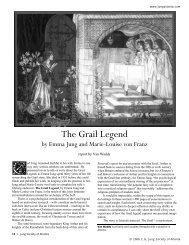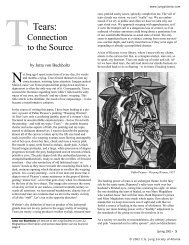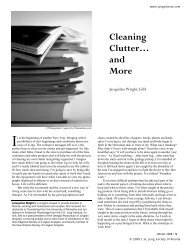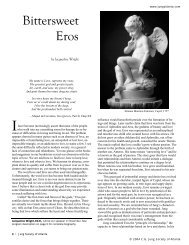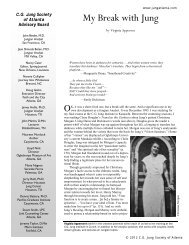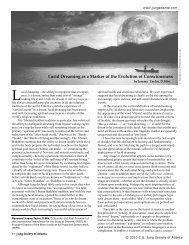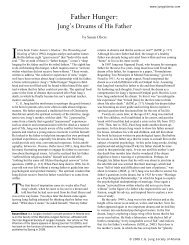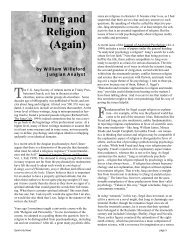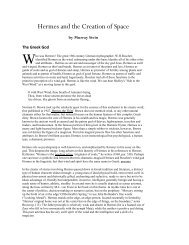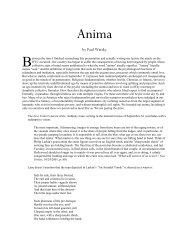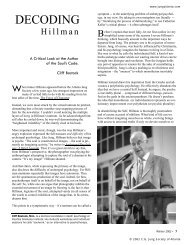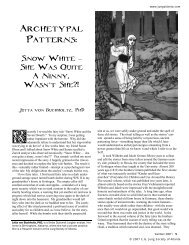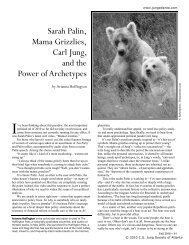Old Age is a Crown Instead of a Curse in Helen Luke's Beautiful ...
Old Age is a Crown Instead of a Curse in Helen Luke's Beautiful ...
Old Age is a Crown Instead of a Curse in Helen Luke's Beautiful ...
Create successful ePaper yourself
Turn your PDF publications into a flip-book with our unique Google optimized e-Paper software.
<strong>Old</strong> <strong>Age</strong> <strong>is</strong> a <strong>Crown</strong> <strong>Instead</strong> <strong>of</strong> a <strong>Curse</strong><br />
<strong>in</strong> <strong>Helen</strong> Luke’s <strong>Beautiful</strong> Hands<br />
R<br />
ilke’s image <strong>of</strong> a man turned ‘round, <strong>in</strong> Du<strong>in</strong>o Elegies,<br />
“tak<strong>in</strong>g leave” on a hillside overlook<strong>in</strong>g a valley that<br />
shows him h<strong>is</strong> home for the last time, congers up for us<br />
the perfect mood for stepp<strong>in</strong>g <strong>in</strong>to a little book called <strong>Old</strong> <strong>Age</strong><br />
by the Jungian analyst <strong>Helen</strong> Luke. Written <strong>in</strong> her eighties, it <strong>is</strong><br />
a jewel and, <strong>in</strong>deed, a backward glance from the heart stance.<br />
Us<strong>in</strong>g Homer’s Odyssey, Shakespeare’s K<strong>in</strong>g Lear and The<br />
Tempest, and a few l<strong>in</strong>es from T.S. Eliot’s Four Quartets, Luke<br />
writes five essays that place before us a feast <strong>in</strong> words and<br />
images. She explores old age as a sacred transition <strong>in</strong> the dimension<br />
<strong>of</strong> time, as an encounter with the Self that <strong>in</strong>vites us, <strong>in</strong><br />
Eliot’s language, to “move <strong>in</strong> measure like a dancer” <strong>in</strong> the<br />
midst <strong>of</strong> the “ref<strong>in</strong><strong>in</strong>g fire.”<br />
The storm-tossed, conquer<strong>in</strong>g Odysseus—still identified<br />
with the hero image <strong>of</strong> himself (h<strong>is</strong> ego), still the driv<strong>in</strong>g architect<br />
<strong>of</strong> h<strong>is</strong> mascul<strong>in</strong>e achievements—<strong>is</strong> confronted by a prophecy<br />
from the bl<strong>in</strong>d seer Teiresias half way through Homer’s<br />
Odyssey. He <strong>is</strong> told he will take a new journey, <strong>in</strong>land, that he<br />
must carry a well-cut oar and travel to a country where people<br />
have never seen an oar. There he will meet a stranger who will<br />
tell him what to do—to plant h<strong>is</strong> oar firmly <strong>in</strong> the earth—a f<strong>in</strong>al<br />
lett<strong>in</strong>g go <strong>of</strong> that which had held for him the mean<strong>in</strong>g <strong>of</strong> h<strong>is</strong><br />
life.<br />
The beauty <strong>of</strong> <strong>Helen</strong> Luke breaks through <strong>in</strong> language and<br />
Van Waddy <strong>is</strong> a psychotherap<strong>is</strong>t <strong>in</strong> Atlanta. See<br />
www.vanwaddy.com<br />
by Van Waddy<br />
www.jungatlanta.com<br />
© Corb<strong>is</strong><br />
dialogue <strong>in</strong> th<strong>is</strong> story <strong>of</strong> Odysseus’ f<strong>in</strong>al journey, for Homer<br />
never f<strong>in</strong><strong>is</strong>hed th<strong>is</strong> part <strong>of</strong> the tale, leav<strong>in</strong>g it to our imag<strong>in</strong>ation<br />
to trace these f<strong>in</strong>al moments. Luke writes poignantly <strong>of</strong> these<br />
f<strong>in</strong>al hours <strong>in</strong> our hero’s life and h<strong>is</strong> struggle to make sense <strong>of</strong><br />
and to release all that had meant someth<strong>in</strong>g to him dur<strong>in</strong>g h<strong>is</strong><br />
full life.<br />
The oar he <strong>is</strong> told to plant <strong>in</strong> a land where no one would<br />
recognize an oar (They’d never seen the sea) would flower <strong>in</strong>to<br />
a tree <strong>of</strong> hope that others might see it and be moved to ask<br />
questions about the journey they themselves had not yet taken.<br />
He had no more use <strong>of</strong> it, he was told, as h<strong>is</strong> task <strong>of</strong> seek<strong>in</strong>g<br />
“knowledge no other man had found,” achiev<strong>in</strong>g results and<br />
exert<strong>in</strong>g power <strong>in</strong> the outer world was over. He had to let all<br />
that go.<br />
Don’t give your oar to your son, he was told, or you will be<br />
preoccupied with how your son uses it, not able to focus on<br />
your task <strong>of</strong> lett<strong>in</strong>g go. Th<strong>is</strong> <strong>is</strong> the work <strong>of</strong> old age: to let go <strong>of</strong><br />
everyth<strong>in</strong>g, even the mean<strong>in</strong>g. Everyone else has to f<strong>in</strong>d their<br />
own mean<strong>in</strong>g.<br />
Lear’s “let’s away to pr<strong>is</strong>on” speech to h<strong>is</strong> daughter Cordelia<br />
<strong>in</strong> K<strong>in</strong>g Lear, occurs towards the end <strong>of</strong> h<strong>is</strong> life, while he <strong>is</strong><br />
<strong>in</strong> h<strong>is</strong> eighties. He <strong>is</strong> a man “impr<strong>is</strong>oned <strong>in</strong> a weakened body,”<br />
with faded powers, enforced <strong>in</strong>activity, yet a man who, accord<strong>in</strong>g<br />
to Luke, “embraces th<strong>is</strong> conf<strong>in</strong><strong>in</strong>g process with love rather<br />
than dragged <strong>in</strong>to it protest<strong>in</strong>g, res<strong>is</strong>t<strong>in</strong>g h<strong>is</strong> <strong>in</strong>evitable impr<strong>is</strong>onment.”<br />
Fall 2006 • 9<br />
© 2006 C.G. Jung Society <strong>of</strong> Atlanta
Lear exhibits the <strong>in</strong>nocence <strong>of</strong> the true feel<strong>in</strong>g value: “So<br />
we’ll live and pray, and s<strong>in</strong>g, and tell old tales, and laugh at<br />
gilded butterflies,” he says. “And take upon the mystery <strong>of</strong><br />
th<strong>in</strong>gs as if we are God’s spies.” To see the sacred <strong>in</strong> all th<strong>in</strong>gs,<br />
to f<strong>in</strong>d the vantage po<strong>in</strong>t <strong>of</strong> the whole and not just our small<br />
part, to be touched by wonder and moments <strong>of</strong> unclouded<br />
v<strong>is</strong>ion—th<strong>is</strong>, <strong>in</strong>deed, makes us “God’s spies,” says Luke. Th<strong>is</strong><br />
<strong>is</strong> the work <strong>of</strong> old age.<br />
No matter how bl<strong>in</strong>d, unbalanced, one-sided a person may<br />
be <strong>in</strong> youth, says Luke, they will be saved <strong>in</strong> the end if they<br />
have had true devotion to someth<strong>in</strong>g beyond the ego— “a<br />
projection <strong>of</strong> their hidden and <strong>of</strong>ten unconscious awareness <strong>of</strong><br />
the Self.” Prospero, <strong>in</strong> Shakespeare’s Tempest,<br />
<strong>is</strong> redeemed <strong>in</strong> old age by h<strong>is</strong> will<strong>in</strong>gness to let go <strong>of</strong> the<br />
powers, the gifts, the creative genius he built up <strong>in</strong> himself all<br />
h<strong>is</strong> life to control and dom<strong>in</strong>ate (characterized by the spirit<br />
Ariel <strong>in</strong> the play). He can do th<strong>is</strong> only after he confronts h<strong>is</strong><br />
own darkness, faces h<strong>is</strong> own truth, and accepts the good and<br />
bad <strong>of</strong> himself “as an essential note <strong>in</strong> the music <strong>of</strong> God, however<br />
d<strong>is</strong>cordant.”<br />
Forgiveness—<strong>of</strong> oneself, <strong>of</strong> all others—see<strong>in</strong>g oneself “<strong>in</strong><br />
unity with all <strong>in</strong> the love which <strong>is</strong> the dance <strong>of</strong> creation,” without<br />
any feel<strong>in</strong>gs <strong>of</strong> superiority or specialness, allows what Luke<br />
calls “the Glory” to enter us. We realize we know noth<strong>in</strong>g, pass<br />
beyond all mean<strong>in</strong>g and mean<strong>in</strong>glessness to that “someth<strong>in</strong>g<br />
else” that <strong>is</strong> the eternal <strong>in</strong> man, <strong>in</strong> k<strong>in</strong>ship with all th<strong>in</strong>gs.<br />
Luke calls th<strong>is</strong> lett<strong>in</strong>g go, th<strong>is</strong> forgiveness and acceptance<br />
<strong>of</strong> oneself as unified with the whole, a “pierc<strong>in</strong>g through to the<br />
Mercy.” Th<strong>is</strong> <strong>is</strong> the work <strong>of</strong> old age: to let go <strong>of</strong> everyth<strong>in</strong>g,<br />
even what we identify as the best <strong>in</strong> us, our gifts, that which has<br />
made us special, that passion to which we have devoted our life.<br />
We become, once more, pure through, God’s music, “the empt<strong>in</strong>ess<br />
that <strong>is</strong> the Mercy, the Compassion, which conta<strong>in</strong>s all<br />
opposites.”<br />
Us<strong>in</strong>g T. S. Eliot’s “Little Gidd<strong>in</strong>g” <strong>in</strong> Four Quartets, Luke<br />
po<strong>in</strong>ts out how three gifts <strong>of</strong>fered by Eliot as com<strong>in</strong>g with old<br />
age—the loss <strong>of</strong> energy and enchantment, the helpless rage at<br />
the terrify<strong>in</strong>g folly <strong>of</strong> men (a projection <strong>of</strong> our own hidden<br />
darkness on to others), and our memories that suffer us to look<br />
back at how we might have been less sa<strong>in</strong>tly than we thought—<br />
allow us to be more aware <strong>of</strong> our oneness with everyth<strong>in</strong>g and<br />
everyone other.<br />
We beg<strong>in</strong> to hear the “music <strong>of</strong> God <strong>in</strong> everyth<strong>in</strong>g happen<strong>in</strong>g,”<br />
whether <strong>of</strong> pa<strong>in</strong> or <strong>of</strong> joy. Through memories re-<br />
10 • Jung Society <strong>of</strong> Atlanta<br />
www.jungatlanta.com<br />
experienced as story, says Luke, one’s life beg<strong>in</strong>s to move <strong>in</strong> a<br />
circle around the still po<strong>in</strong>t <strong>of</strong> the Center, no longer a straight<br />
l<strong>in</strong>e, but as a small pattern, unique and constant, <strong>in</strong> the dance <strong>of</strong><br />
creation. We experience a joy that comes when we no longer<br />
seek happ<strong>in</strong>ess, no longer seek anyth<strong>in</strong>g. Rest<strong>in</strong>g <strong>in</strong> the present<br />
moment—the only place the Self can live—we just are.<br />
Luke ends her reflections by po<strong>in</strong>t<strong>in</strong>g out the difference<br />
between suffer<strong>in</strong>g and a neurotic state <strong>of</strong> mean<strong>in</strong>gless depression—between<br />
the weight <strong>of</strong> our experience which we carry<br />
with full consciousness (as part <strong>of</strong> the work<strong>in</strong>g out <strong>of</strong> the div<strong>in</strong>e<br />
dance <strong>of</strong> opposites <strong>in</strong> us) or a weight under which we fall and<br />
lie <strong>in</strong> self pity.<br />
“Every time a person exchanges neurotic depression for<br />
real suffer<strong>in</strong>g, he or she <strong>is</strong> shar<strong>in</strong>g to some small degree <strong>in</strong> the<br />
carry<strong>in</strong>g <strong>of</strong> the suffer<strong>in</strong>g <strong>of</strong> mank<strong>in</strong>d, <strong>in</strong> bear<strong>in</strong>g a t<strong>in</strong>y part <strong>of</strong><br />
the darkness <strong>of</strong> the world.” Th<strong>is</strong> allows mean<strong>in</strong>g to enter our<br />
suffer<strong>in</strong>g and to build an undercarriage <strong>of</strong> suffer<strong>in</strong>g upon which<br />
the superstructure <strong>of</strong> our life may securely rest. Th<strong>is</strong> happens<br />
only when we can come to a standpo<strong>in</strong>t which consciously<br />
accepts bless<strong>in</strong>g and curse as one <strong>in</strong> the psyche.<br />
Such a standpo<strong>in</strong>t, such a conscious standpo<strong>in</strong>t, can happen<br />
at any age. As Luke says, every <strong>in</strong>dividual rema<strong>in</strong>s free to<br />
choose whether he or she “will let go <strong>of</strong> everyth<strong>in</strong>g else so that<br />
the new creation <strong>of</strong> us will be born.” In old age, th<strong>is</strong> choice can<br />
mean the difference between radiance and retreat <strong>in</strong>to useless<br />
cl<strong>in</strong>g<strong>in</strong>g, between “allow<strong>in</strong>g the Glory to enter” and rail<strong>in</strong>g <strong>in</strong><br />
desperate despair.<br />
I have provided here a postage-stamp view <strong>of</strong> a pr<strong>of</strong>ound<br />
work <strong>of</strong> depth. <strong>Helen</strong> Luke’s <strong>Old</strong> <strong>Age</strong> will sit on my own bedside<br />
table well <strong>in</strong>to my old age, a companion, a heal<strong>in</strong>g, a hand<br />
to help me let go to “the empt<strong>in</strong>ess that <strong>is</strong> the Mercy, the Compassion,<br />
which conta<strong>in</strong>s all opposites.”<br />
Luke rem<strong>in</strong>ds me <strong>of</strong> someth<strong>in</strong>g I myself wrote some years<br />
ago: “When the shell <strong>of</strong> our life falls away, when the voice<br />
from with<strong>in</strong> becomes the only sound we can hear, when the<br />
night dreams we have collected over the years take on a life <strong>of</strong><br />
their own, we will dance old age, laugh<strong>in</strong>g. We will climb upon<br />
the back <strong>of</strong> the soul that has accompanied us on th<strong>is</strong> magnificent<br />
journey and ride it, s<strong>in</strong>g<strong>in</strong>g, <strong>in</strong>to death.”<br />
<strong>Helen</strong> Luke has helped me to experience th<strong>is</strong> lett<strong>in</strong>g go, <strong>in</strong><br />
my body, through images and words, while I am still <strong>in</strong> my<br />
sixties. I am more ready, more clear about what that means,<br />
thanks to her own generous backward glance. ■<br />
© 2006 C.G. Jung Society <strong>of</strong> Atlanta



